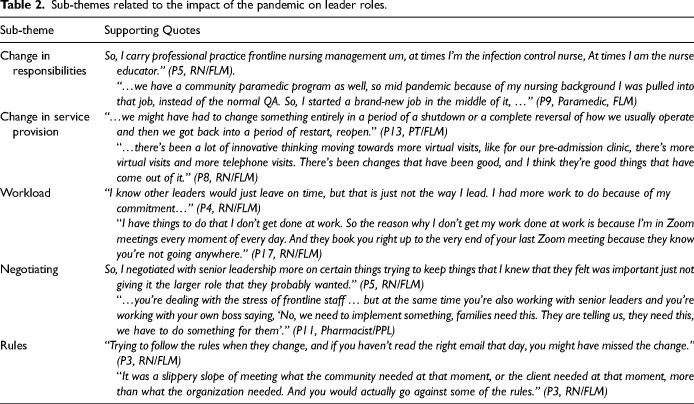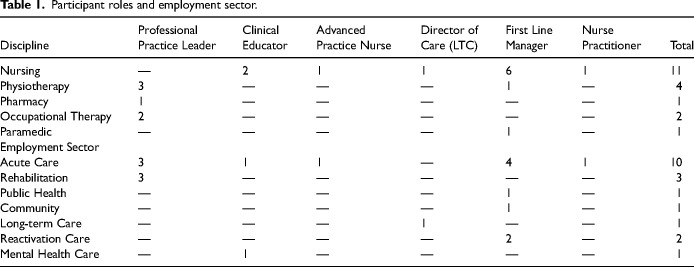Sue Bookey-Bassett, Don Rose, Nancy Purdy, Kim Cook, Martha Harvey, Anthony Danial, Melanie Woodside, Michelle Belov
下载PDF
{"title":"加拿大安大略省 COVID-19 大流行期间多学科一线医疗保健领导者的角色和经验。","authors":"Sue Bookey-Bassett, Don Rose, Nancy Purdy, Kim Cook, Martha Harvey, Anthony Danial, Melanie Woodside, Michelle Belov","doi":"10.1177/08445621241236665","DOIUrl":null,"url":null,"abstract":"<p><strong>Background: </strong>Throughout the COVID-19 pandemic, first-line healthcare leaders across the healthcare system played crucial roles leading, motivating, and supporting staff.</p><p><strong>Purpose: </strong>This study aims to describe multidisciplinary first-line healthcare leaders' experiences during the COVID-19 pandemic in Ontario, Canada using transformational and crisis leadership theory.</p><p><strong>Methods: </strong>A descriptive two-phase (quantitative & qualitative) design was conducted in the spring of 2021. Phase 1 employed an online survey sent via email to first-line leaders from various sectors who were members of healthcare professional associations in Ontario. Participants included nurse managers, professional practice leaders (e.g., occupational and physiotherapists), advanced practice nurses, and clinical educators. In Phase 2, a subset (n = 19) of the Phase 1 participants were interviewed to gain a deeper understanding of these leaders' experiences including role impact and support available. Semistructured individual interviews were conducted and recorded via Zoom©. Inductive and deductive analysis approaches identified key themes. This paper reports the qualitative findings from Phase 2.</p><p><strong>Results: </strong>Leaders' behaviors were representative of the key dimensions of transformational and complexity leadership theories. Recommendations for leading during a crisis included: engaging in self-care activities to manage the personal impact of the crisis; teamwork and collaborative leadership; and support from fellow first-line leaders and senior leaders. Findings can inform healthcare leadership education programs designed to manage future crises for both academic and practice settings.</p><p><strong>Conclusion: </strong>Descriptions of first-line healthcare leaders' roles and experiences during multiple waves of the COVID-19 pandemic validated their important contributions within various health sectors.</p>","PeriodicalId":46661,"journal":{"name":"Canadian Journal of Nursing Research","volume":" ","pages":"269-280"},"PeriodicalIF":2.9000,"publicationDate":"2024-09-01","publicationTypes":"Journal Article","fieldsOfStudy":null,"isOpenAccess":false,"openAccessPdf":"https://www.ncbi.nlm.nih.gov/pmc/articles/PMC11308263/pdf/","citationCount":"0","resultStr":"{\"title\":\"Multidisciplinary First-Line Healthcare Leaders' Roles and Experiences During the COVID-19 Pandemic in Ontario Canada.\",\"authors\":\"Sue Bookey-Bassett, Don Rose, Nancy Purdy, Kim Cook, Martha Harvey, Anthony Danial, Melanie Woodside, Michelle Belov\",\"doi\":\"10.1177/08445621241236665\",\"DOIUrl\":null,\"url\":null,\"abstract\":\"<p><strong>Background: </strong>Throughout the COVID-19 pandemic, first-line healthcare leaders across the healthcare system played crucial roles leading, motivating, and supporting staff.</p><p><strong>Purpose: </strong>This study aims to describe multidisciplinary first-line healthcare leaders' experiences during the COVID-19 pandemic in Ontario, Canada using transformational and crisis leadership theory.</p><p><strong>Methods: </strong>A descriptive two-phase (quantitative & qualitative) design was conducted in the spring of 2021. Phase 1 employed an online survey sent via email to first-line leaders from various sectors who were members of healthcare professional associations in Ontario. Participants included nurse managers, professional practice leaders (e.g., occupational and physiotherapists), advanced practice nurses, and clinical educators. In Phase 2, a subset (n = 19) of the Phase 1 participants were interviewed to gain a deeper understanding of these leaders' experiences including role impact and support available. Semistructured individual interviews were conducted and recorded via Zoom©. Inductive and deductive analysis approaches identified key themes. This paper reports the qualitative findings from Phase 2.</p><p><strong>Results: </strong>Leaders' behaviors were representative of the key dimensions of transformational and complexity leadership theories. Recommendations for leading during a crisis included: engaging in self-care activities to manage the personal impact of the crisis; teamwork and collaborative leadership; and support from fellow first-line leaders and senior leaders. Findings can inform healthcare leadership education programs designed to manage future crises for both academic and practice settings.</p><p><strong>Conclusion: </strong>Descriptions of first-line healthcare leaders' roles and experiences during multiple waves of the COVID-19 pandemic validated their important contributions within various health sectors.</p>\",\"PeriodicalId\":46661,\"journal\":{\"name\":\"Canadian Journal of Nursing Research\",\"volume\":\" \",\"pages\":\"269-280\"},\"PeriodicalIF\":2.9000,\"publicationDate\":\"2024-09-01\",\"publicationTypes\":\"Journal Article\",\"fieldsOfStudy\":null,\"isOpenAccess\":false,\"openAccessPdf\":\"https://www.ncbi.nlm.nih.gov/pmc/articles/PMC11308263/pdf/\",\"citationCount\":\"0\",\"resultStr\":null,\"platform\":\"Semanticscholar\",\"paperid\":null,\"PeriodicalName\":\"Canadian Journal of Nursing Research\",\"FirstCategoryId\":\"1085\",\"ListUrlMain\":\"https://doi.org/10.1177/08445621241236665\",\"RegionNum\":0,\"RegionCategory\":null,\"ArticlePicture\":[],\"TitleCN\":null,\"AbstractTextCN\":null,\"PMCID\":null,\"EPubDate\":\"2024/3/12 0:00:00\",\"PubModel\":\"Epub\",\"JCR\":\"Q2\",\"JCRName\":\"NURSING\",\"Score\":null,\"Total\":0}","platform":"Semanticscholar","paperid":null,"PeriodicalName":"Canadian Journal of Nursing Research","FirstCategoryId":"1085","ListUrlMain":"https://doi.org/10.1177/08445621241236665","RegionNum":0,"RegionCategory":null,"ArticlePicture":[],"TitleCN":null,"AbstractTextCN":null,"PMCID":null,"EPubDate":"2024/3/12 0:00:00","PubModel":"Epub","JCR":"Q2","JCRName":"NURSING","Score":null,"Total":0}
引用次数: 0
引用
批量引用
Multidisciplinary First-Line Healthcare Leaders' Roles and Experiences During the COVID-19 Pandemic in Ontario Canada.
Background: Throughout the COVID-19 pandemic, first-line healthcare leaders across the healthcare system played crucial roles leading, motivating, and supporting staff.
Purpose: This study aims to describe multidisciplinary first-line healthcare leaders' experiences during the COVID-19 pandemic in Ontario, Canada using transformational and crisis leadership theory.
Methods: A descriptive two-phase (quantitative & qualitative) design was conducted in the spring of 2021. Phase 1 employed an online survey sent via email to first-line leaders from various sectors who were members of healthcare professional associations in Ontario. Participants included nurse managers, professional practice leaders (e.g., occupational and physiotherapists), advanced practice nurses, and clinical educators. In Phase 2, a subset (n = 19) of the Phase 1 participants were interviewed to gain a deeper understanding of these leaders' experiences including role impact and support available. Semistructured individual interviews were conducted and recorded via Zoom©. Inductive and deductive analysis approaches identified key themes. This paper reports the qualitative findings from Phase 2.
Results: Leaders' behaviors were representative of the key dimensions of transformational and complexity leadership theories. Recommendations for leading during a crisis included: engaging in self-care activities to manage the personal impact of the crisis; teamwork and collaborative leadership; and support from fellow first-line leaders and senior leaders. Findings can inform healthcare leadership education programs designed to manage future crises for both academic and practice settings.
Conclusion: Descriptions of first-line healthcare leaders' roles and experiences during multiple waves of the COVID-19 pandemic validated their important contributions within various health sectors.



 求助内容:
求助内容: 应助结果提醒方式:
应助结果提醒方式:


